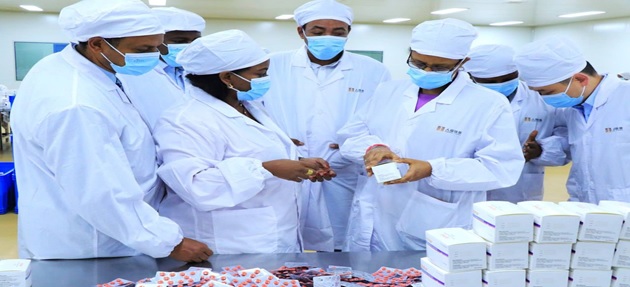
Recently, a high-level delegation led by the State Minister of Health, Frehiwot Abebe (MD), comprises representatives from the Ministry of Health, the Armauer Hansen Research Institute (AHRI), the Ethiopian Food and Drug Control Authority, and the Ethiopian Medicines Supply Service, visited Humanwell Pharmaceutical Ethiopia PLC, a Chinese owned company and one of the country’s key pharmaceutical manufacturing entities.
Speaking on the occasion, State Minister Frehiwot Abebe said that the share of domestic pharmaceutical manufacturers in country’s drug supply chain is increasing significantly. She underscored the importance of boosting local drug production capacity in both quantity and quality to ensure a sustainable supply chain of medicines and medical equipment. She also stated that the products must be competitive in quality both nationally and internationally, as stated on the social media page of the Ministry.
Frehiwot acknowledged that previous challenges hindering domestic production are gradually being addressed, and she expressed her Ministry’s readiness to collaborate with relevant stakeholders and provide the necessary support. The establishment of the Domestic Pharmaceutical Manufacturing Industry Development Forum has been initiated to facilitate the growth of the local medicine and medical devices manufacturing industries.
She further noted that the pharmaceutical sector in Ethiopia has become a vital component of the nation’s economic development and public health strategy. Despite facing numerous challenges, there is a significant opportunity to enhance local pharmaceutical manufacturing industries, thereby promoting self-sufficiency, improving healthcare access, and stimulating economic growth. This article outlines the multifaceted approaches required to strengthen these industries, focusing on policy frameworks, technological advancements, capacity building, and public-private partnerships.
According to the State Minister, a robust policy framework is essential for the growth of the pharmaceutical manufacturing sector. In this respect, the Ethiopian government has made commendable progress through the formulation of the National Pharmaceutical Industry Development Strategy. However, to effectively bolster local production, it is imperative to streamline regulatory processes. Simplifying approval mechanisms for new drugs and providing incentives for local manufacturers can stimulate investment and innovation. Furthermore, enhancing transparency and efficiency within the Ethiopian Food and Drug Authority (EFDA) will bolster the confidence of both local and foreign investors.
To compete with established global pharmaceutical companies, Ethiopian manufacturers must embrace technological innovations. Investing in modern production techniques and research and development is crucial for improving the quality and efficacy of locally produced medicines. Establishing partnerships with international pharmaceutical firms can facilitate the transfer of technology and expertise, allowing Ethiopian manufacturers to adopt best practices in production and quality assurance. Additionally, the establishment of research institutions dedicated to pharmaceutical sciences can foster innovation and address local health challenges.
She underlined, the success of the pharmaceutical sector is inextricably linked to the availability of a skilled workforce. Thus, capacity-building initiatives must be prioritized. Collaborating with universities and technical institutions to develop targeted training programs can equip graduates with the necessary skills to thrive in the pharmaceutical industry. Continuous professional development for existing employees is also essential to keep pace with advancements in technology and regulatory requirements. By investing in human capital, Ethiopia can cultivate a workforce capable of propelling the pharmaceutical sector forward.
The establishment of synergistic public-private partnerships (PPPs) can significantly enhance the local pharmaceutical manufacturing landscape. The government will keep on actively engage with private sector stakeholders to identify barriers to growth and collaborate on viable solutions. Such partnerships can facilitate access to financing, resource sharing, and joint ventures that leverage the strengths of both sectors. Furthermore, promoting local manufacturers in public procurement processes can ensure a steady demand for domestically produced pharmaceuticals, thereby incentivizing further investment in the industry.
Ethiopian Food and Drug Control Authority Director General Heran Gerba, highlighted that her institution has been actively collaborating with local pharmaceutical manufacturers, providing support and feedback since the construction design phase. Mentioning that currently the factory is in a good capacity of producing drugs, Heran stressed the necessity of providing special attention to ensuring drug quality by integrating human resources with technology and following approaches that leads to drug quality.
Armauer Hansen Research Institute (AHRI) Director General Prof. Afework Kassu also reflected on the progress made since Humanwell Pharmaceuticals Manufacturing Factory commenced operations seven years ago. He commended the Factory for its increased production capacity and significant contribution not only to the domestic supply of medicines, but also embarking upon exports. He also reiterated AHRI’s commitment to strengthening its multifarious support for domestic pharmaceutical manufacturers in line with its responsibilities and mandate bestowed upon it.
Mentioning the ambition to develop AHRI into a center of excellence not only at home but in East Africa and numerous activities are being undertaken such as medical research, bioequivalence, and bio-analytical services to this end, he expressed his Institute’s interest in working in collaboration with the Factory.
Ethiopian Medicines Supply Service Deputy Director General Solomon Nigussie also, remarked Humanwell Pharmaceuticals Factory’s substantial share in the medicine supply chain, and its timely delivery. Concluding the visit, Factory’s General Manager Ling Zhenyong expressed his gratitude for the feedback received; and pledged to enhance operational effectiveness. He also voiced appreciation for the coordinated support from relevant government agencies aimed at boosting domestic pharmaceutical productivity.
In conclusion, the strengthening of local pharmaceutical manufacturing industries in Ethiopia is not only an economic necessity but also a vital strategy for enhancing public health. By focusing on policy reforms, technological innovation, capacity building, and fostering public-private partnerships, Ethiopia can cultivate a sustainable pharmaceutical sector that meets the needs of its population and contributes to national development.
The Local Pharmaceutical Industry Development Forum (LoPID) was established to accelerate the growth of the local medicine and medical devices manufacturing industries in Ethiopia in accordance with the African Union’s 2063 agenda… Chaired by the Ministry of Health, LoPID comprises 13 government institutions and 11 non-governmental organizations as members, it was learnt.
BY MENGISTEAB TESHOME
THE ETHIOPIAN HERALD TUESDAY 25 MARCH





